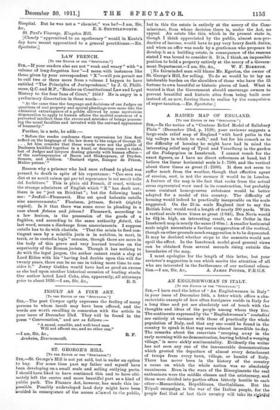LAW FRENCH.
[To THE EDITOR Or THE "SPECTATOR."]
Stu,—If your readers also are not "weak and weary" with "a
volume of long-forgotten lore "—I mean with instances like those given by your correspondent " X "—will you permit me to cull two or three more from a volume I happen to have
entitled "The Principles of Jurisprudence," by J. G. Philli- more, Q.C. and M.P., "Reader on Constitutional Law and Legal History to the four Inns of Court," 1856? He is angry in a preliminary dissertation in these words :-
" At the came time the language and decisions of our Judges on questions of real property and special pleadings were more like the whimsical extravagance of a goblin allowed by some mysterious dispensation to apply to human affairs the morbid acuteness of a perverted intellect than the errors and mistakes of beings possess- ing the usual faculties and invested with the outward appearance of humanity."
Further, in a note, he adds :-
"Before the reader condemns these expressions let him first reflect on the language of the law down to the reign of George II. . . . let him consider that these words were not the gabble of Bushmen huddled together in a kraal, or dancing round a stake, but of Judges and lawyers dealing gravely with human affairs— of the contemporaries of Bacon and Shakespeare, of Dryden, Somers, and Addison. Bastard eigne, Bumper de Prison, Mulier puisne.' " Reason why a prisoner who had once refused to plead was pressed, to death in spite of his repentance : " Ceo sera son diet et ne seroit raison qui par tel repentance le roi seroit toile del forfeiture." This is plain old French, if cruel, without the strange admixture of English which " X" has dealt out; there is no " ject un Brickbat " ; but the following beats me : " Jeofail—Flemeswit. Hoc est quod habeatis catalla sine amer•ceamento." Floatsam, jettsam. fletwit (rightly
copied). Is it that there was some error in pleading in a
case about flotsam and jetsam? Flemeswit, according to a law lexicon, is the possession of the goods of a fugitive, and according to the same authority fletwit, the last word, means a discharge from amerciaments. I suppose catalla has to do with chattels. " That the seisin to feed con- tingent uses by a scintilla juris is in nubibus, in marl, in terra, or in custodies legis " remains, though there are more in
the body of this grave and very learned treatise on the superiority of the Roman jurists. Though it has nothing to
do with the legal jargon, the author cannot resist a slap at Lord Eldon with his "having had doubts upon this will for twenty years, there can be no use in taking more time to con- sider• it." Jenny Geddes would have had as good an excuse as she had upon another historical occasion of hurling stools. Our author hated Lord Coke, also, apparently, all attorneys
prior to about 1830.—I am, Sir, &c., R. S.






































 Previous page
Previous page